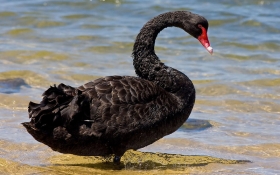
Black Swan
Cygnus atratus
Animal Behavior: Black swans tend to move in flocks. They are the least territorial of all swans and sometimes nest in colonies. They are nomadic when food is scarce but are otherwise sedentary. They feed at dusk and travel at night, calling as they fly, but most activity is during the day.
Eating Habits: Cygnus atratus eat sub-aquatic foliage that it can reach under water using its long neck. It is herbivorous, eating vegetation and plants either in the water or on land in pastures or on farm land. Some common aquatic plants that they feed on are: Typha, Potamogeton, Myriophyllum, Ruppia and algae. Occasionally they also eat insects.
Range: Native to Australia (including Tasmania) and have been introduced to New Zealand, Europe, and North America. Black swans are found mainly in the wetlands of southern Australia and tend to avoid the northern tropics. They can also be found across the rest of southern Australia, and in the southeast of Tasmania. After being introduced to Europe as pets, they can now be found there in the wild.
Conservation Efforts: Currently, black swans are not suffering from population declines. Populations range from the thousands up to tens of thousands in New South Wales.
Animal Facts: Black swans are monogamous and often have the same mate for life. They are territorial and stay in solitary pairs when mating but are known to occasionally mate in colonies. Each female may lay between 5 to 6 eggs, the eggs are laid one day apart. Black swans have been known to live for forty years in the wild.
